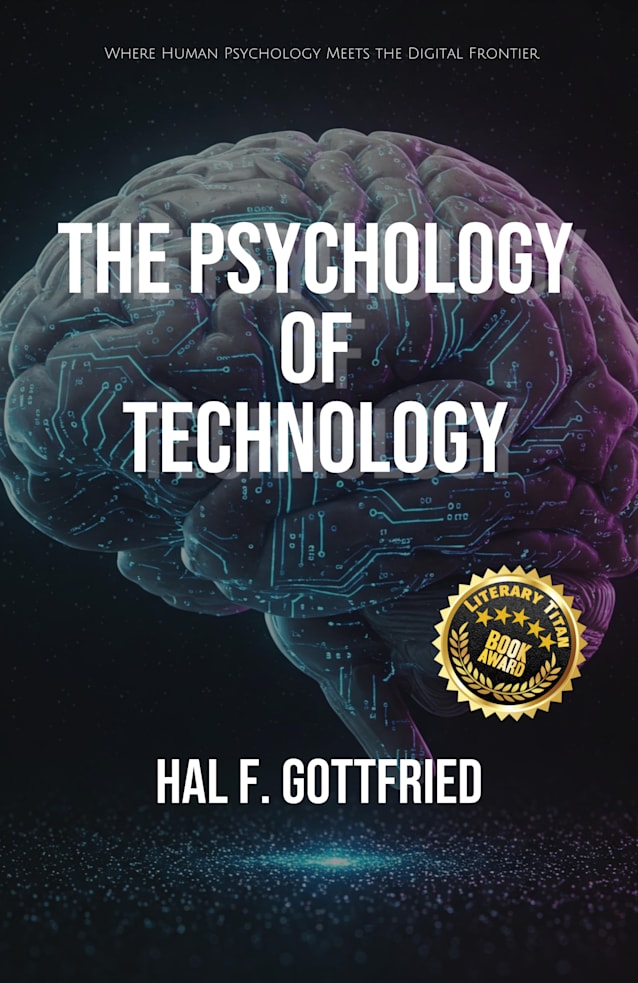The Psychology of Technology
About
The screen beckons, the notifications buzz, and the lines between our physical and digital selves blur. In this groundbreaking exploration, award-winning author Hal Gottfried reveals the profound psychological impact of technology on our lives and how to reclaim control.
From the dopamine loops of social media engineered to keep us hooked, to algorithms that predict our behavior better than our closest friends, we’re witnessing a fundamental transformation of the human mind. This isn’t just a critique of technology; it’s a deep dive into the neuroscience behind our digital habits, revealing how constant connectivity is reshaping our brains, attention spans, and emotional responses.
Delve into the complex psychology of online identity, where curated personas and social comparison fuel anxieties and shape self-esteem. Explore the paradox of connection: how we’re more digitally linked than ever, yet often feel profoundly isolated. Uncover why “multitasking” is actually sabotaging your productivity, how the mere presence of a phone diminishes conversation quality, and the mechanisms behind information overload and misinformation in our algorithm-driven world.
But awareness is only the starting point. Gottfried offers a practical roadmap for thriving in the digital age: master focused attention in a distraction-heavy world, use technology intentionally rather than habitually, and develop the critical thinking skills needed to navigate our information-saturated landscape.
Whether you’re a digital native or seasoned user struggling with screen time, concerned about relationships, or simply wanting to understand why you can’t put your phone down, this book illuminates the psychological forces shaping our digital lives and shows you how to shape them back.
Transform your relationship with technology before it transforms you.
Praise for this book
What makes this book special is Hal’s balanced approach to our digital lives. He delves into the neuroscience of how technology affects our brain chemistry and attention spans, but presents these insights in accessible, engaging language that never feels like you're reading a research paper.
Hal doesn't vilify technology—instead, he promotes what he calls "Intentional Use," a framework that helps readers distinguish between technology that enriches their lives and digital habits that quietly drain their time and mental energy. The book is filled with thought-provoking questions that prompt genuine self-reflection about your personal tech habits.
One of the book's strengths is addressing how we navigate our technology saturated lives, both personal and professional. Hal acknowledges the reality that a complete digital detox isn't practical for most people, instead offering realistic strategies for creating boundaries that work in the modern workplace and home environment to include personal relationships.
What resonated with me most was Hal's exploration of how our constant connectivity fragments our attention and reshapes our social connections and work productivity. He explains how the steady stream of notifications and focus interruptions prevents us from engaging in the type of deep, absorbed work and presence that leads to our most meaningful accomplishments and satisfaction.
Through out the book, Hal provides concrete, actionable steps—daily practices, weekly check-ins, and environmental changes—that help you reclaim your attention without feeling deprived. These aren't rigid rules but adaptable principles you can customize to your life.
I recommend this book to anyone who feels overwhelmed by their digital life but values the benefits technology brings. Hal shows how your engagement with technology can become more rewarding and intentional while becoming significantly less time-consuming and overwhelming.
Often we trade advice with each other such as, you should turn off all of your social media for a weekend or wear tin foil hats to keep the space rays out. This is basically in the form of any other modern myth. But the problems living in this modern noisy world is really there! So we keep looking for solutions, finding solutions each more absurd than the other. The research driven approach presented in The Psychology of Technology is a practical guide to identifying all of the things that are conspiring to rob us of our ability to give our full attention. In this book it also provides practical solutions to address these problems too. I would recommend this book to any one who is trying to claw back their precious time, bring focus and reclaim their daily life.
This was a very interesting read. I found his perspective on how technology impacts our lives as very poignant and relatable. He made a lot of very solid points about how reliant we are on technology and how it does shape the world that we’re in, maybe not always for the better. In some ways it feels as if technology takes a little bit of human out of our lives because we are so engaged with it. However, he also makes some very solid points about how wonderful advancements have been when used as intended and how they have contributed to our society. I really enjoyed this book and I hope he comes out with a second!
